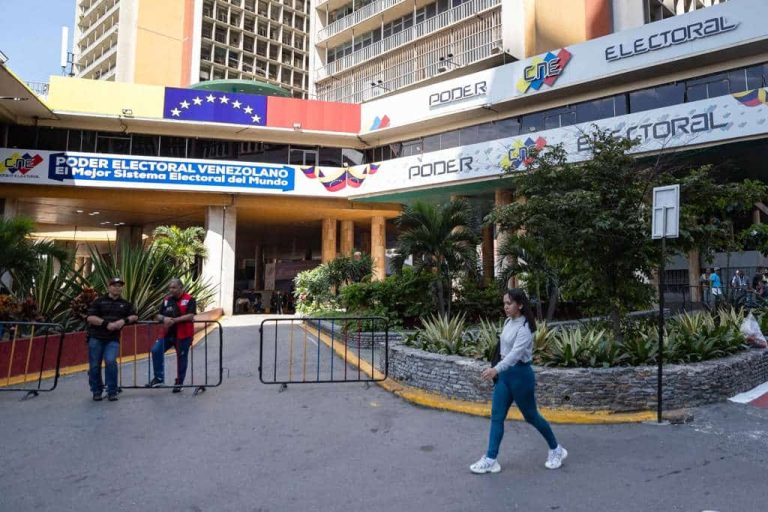28 de julio 2024

Children of Exile: The Births “Sowing Hope” in the Camp of Nicaraguan Farmers

PUBLICIDAD 1M
PUBLICIDAD 4D
PUBLICIDAD 5D
An agreement that describes values and practices necessary for both Venezuela and Nicaragua in their transition towards democracy

A Venezuelan citizen walks in front of the headquarters of the National Electoral Council (CNE) in Caracas. Photo: EFE / Ronald Peña R
Sometimes, a reality check is necessary to analyze and make the concrete changes that we are not capable of envisioning from our imagination.
I have carefully read the document “The Spirit of July 28 —Agreement for a Government of Democratic Transformation,” signed by the opposition and reflecting the sentiments of the Venezuelan people. Although realities cannot be generalized from one place to another, there are aspects of sociopolitical processes that bring us many lessons.
As Nicaraguan society, we possess many virtues and values to be proud of, and in our historical development, we have also demonstrated dignity and patriotism. But this time, I want to refer to our challenges. One of them is the undemocratic political culture in which we have grown and which permeates our society, often unconsciously.
Among the practices I observe are excessive ideological polarization, hatred towards those who think differently, a spirit of revenge that prevails over justice, marked authoritarianism, violent and exclusionary language, the use of stigmatization and discrediting of others as a form of exclusion. There is also the belief in being the sole possessors of the truth and, in some cases, imposing oneself as the chosen one.
We also suffer the lack of active listening, openness to change and collective learning, little habit of reading, and holding informed and well-argued political dialogue. Additionally, victimization and charging the homeland for what has been suffered during the struggle. The presence of non-transparent practices, not keeping one’s word, opportunism, and sometimes the use of lies and distortion of facts for one’s benefit.
These are some manifestations of that political culture that has nested in our society and is surely both cause and effect of the lack of harmony, dialogue, encounter, and understanding among us. We are a society of accumulated griefs, with a history of betrayals and pacts between leaders, manipulation and impoverishment, traumas from the family, generating distrust and the use of violence in its various forms as a daily practice.
I mention the “Agreement for a Government of Democratic Transformation” signed by the Venezuelan opposition in the context of their national elections this Sunday, July 28, 2024, because there I find that purpose of change in ways of thinking, judging, and acting. This agreement describes values and practices necessary for both Venezuela and Nicaragua in their transition towards democracy, such as “the recovery of freedom,” “the spirit of unity,” “the foundation in popular support,” “civilized political cooperation,” “democratic culture based on consensus,” “respectful treatment in political deliberation,” and “educated speech.”
It also refers to “the recovery of human dignity,” which makes me think that being Nicaraguan is not determined by the ideology you profess because we are all Nicaragua. Likewise, it points out respect for the foundations of the Constitution, meaning that what society has accumulated and advanced should not be swept away and ignored. We must not forget to “heal and move forward with respect towards justice and peace” because now we recognize that collectively healing accumulated pain is essential to achieving justice and lasting peace that starts with ourselves. And above all, the “sense of urgency,” which is also crucial for our suffering Nicaragua.
With this, I want to congratulate the Venezuelan people and their leadership who, despite 25 years of struggle, are interpreting the challenges of the moment to lay the foundations for a true transformation towards democracy. I want to invite us to make our own what this agreement wisely proposes: “The task is today, here and now.”
We are all Venezuela.
This article was published in Spanish in Confidencial and translated by Havana Times. To get the most relevant news from our English coverage delivered straight to your inbox, subscribe to The Dispatch.
PUBLICIDAD 3M
Activista nicaragüense exiliada. Licenciada en Ciencias Sociales y máster en Integración y Desarrollo. Fundadora del Instituto de Liderazgo de Las Segovias (ILLS). Tiene más de 30 años de experiencia en defensa de los derechos humanos, y es consultora en planeación y desarrollo, integración regional, políticas públicas, participación ciudadana, empoderamiento y democracia.
PUBLICIDAD 3D